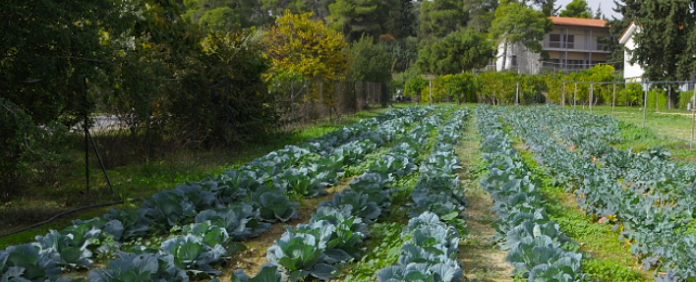“THEOTOKOS” Foundation
“THEOTOKOS” Foundation is a non-profit welfare organization (private law entity) and has been operating continuously since 1963. It is managed by a 9-member Honorary Board of Directors and is supervised by the Ministry of Labour, Social Security and Welfare. Special education and therapy services are provided to preschool children aged 2,5 – 5 years (early intervention) and to teenagers aged 14 – 20 years with developmental delays, developmental intellectual disorders, and autism spectrum disorders. Vocational training and rehabilitation are provided to young adults aged 20 – 35 years.
More than 5,000 individuals have been supported and have received services during the 52 years of the foundation’s operation.
Project objectives
In 2013-2014 the Foundation implemented the European co-financed project “Digital Convergence”. Since then, the project continued its function and it is ongoing.
Based on this specific project, the following were developed:
- Digital Welfare File, for the digital management and the further utilization of welfare data, deepening the interdisciplinary functioning of our scientific and educational personnel.
- Internet portal
- Serious games (Interactive educational games)
- Digital library
- Online applications and transactions
- Tele-counselling
The basic core of the new digital welfare file was, initially, to digitally record all “THEOTOKOS” service users based on the International Classification of Functioning, Disability and Health for Children and Youth ICF and ICF-CY.
Using ICFthey create the functionality profile of each beneficiary, focusing on what they can do and their strengths.
The practice is used also for vocational training and education. They create ICF profiles for clients from 3.5-40 years old (the age range of the THEOTOKOS) so some are in education departments and others in vocational training departments.
Through the process they try to ensure that all evaluators evaluate in the same way, they focus on the weakest points and set such goals in order to strengthen them. Thus, the goal setting becomes more specific and targeted.
The ICF can be characterized as a versatile classification system designed to serve various disciplines across several sectors and can be useful for a wide range of diverse applications, e.g. social security, evaluation of health care management and population surveys at the local, national and international level.
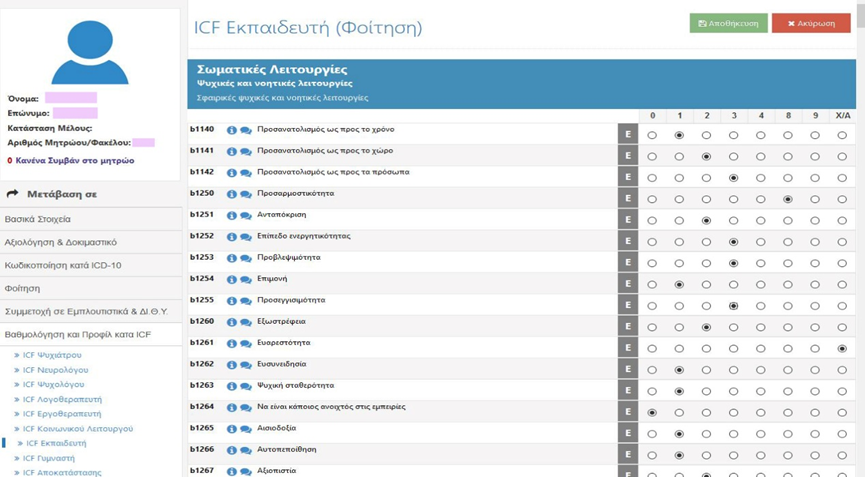
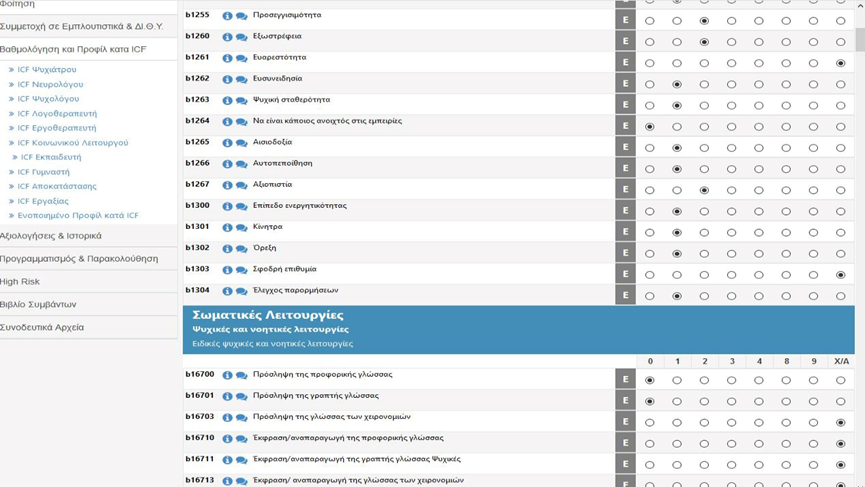
*The images above show us the form that the trainers fill in with the ICF codes that are selected by them.
The evaluation takes place in the educational facilities. Depending on the specialty, the evaluation is done individually or in a group. Information from both individual and group evaluation is important because it shows how the environment affects the performance of the beneficiary. Instructors evaluate once a year, psychologists every two years, social workers every 5 years. The goal setting is evaluated 2-3 times per year depending on the age and the goal.
There is a wide range of trainers: Special educators, Occupational therapists, Psychologists (working on teams as trainers) Craftsmen of various specialties, Psych pedagogues Most of themwork for more than 10 years at Theotokos.
What they have achieved with the use of the ICF is that everyone speaks the same language evaluates and writes the targeting in the same way regardless of their scientific background.
In countries such as Belgium, adults seeking employment services are self-assessed according to ICF.
In Theotokos foundation they have not yet applied it for self-evaluation.
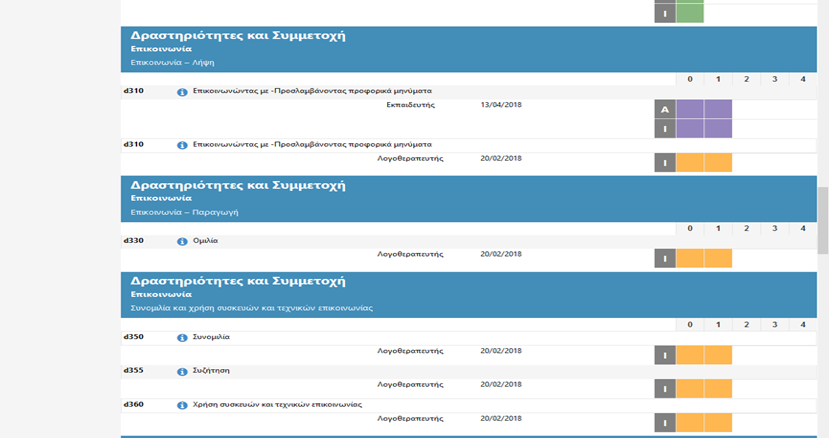
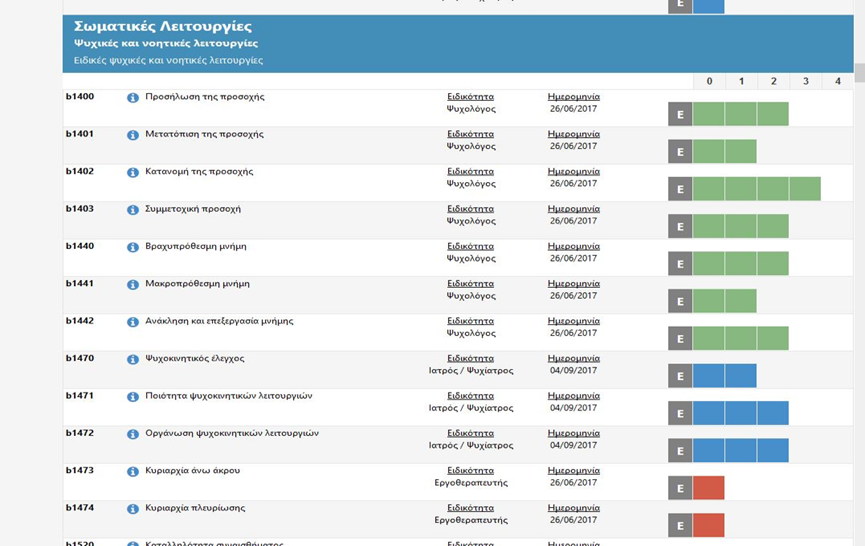
**The images above show us the ICF rehabilitation. It shows the specialties that everyone has evaluated with a different colour. The visualized profile is helpful for the evaluator.
Development, progress, and results
This program is an ongoing developing project. Specifically, it has been designed to:
- Provide a scientific base for understanding and studying health and health-related conditions, outcomes, and critical factors.
- Establish a common language for describing health and health-related conditions, in order to improve communication between different users (health care workers, researchers, policy makers as well as people with disabilities).
- Allow comparison of the available data across countries, across disciplines that provide health services and across health services.
- Provide a systematic coding scheme for health information systems.
As an extension, the Interdisciplinary Team at “THEOTOKOS” is endeavouring to plan individual therapy and education intervention based on the results of classification with the ICF, an effort which is considered innovative and is currently in progress.
What they want to achieve is young people applying to the rehabilitation service for a job placement should have a complete ICF profile from all specialties. This will give the job coaches enough information so that the professional profile is completed in less time and no information is lost. In essence the ICF profile will be the core around which the professional profile will be built.
The foundation is disseminating the results of the project by exchanging good practices with the EPR network (EPR is a community of service providers working with people with disabilities committed to high quality service delivery https://www.epr.eu/)
References
www.http://www.theotokos.gr/icftheotokos.gr/theotokos
http://www.theotokos.gr/icf
https://www.epr.eu/
Contact details
Name: THEOTOKOS FOUNDATION
Address: 2, THEOTOKOU STR ILION, 13122
Contact person: Vaia Arsenopoulou
Phone number: 0030 210 23 85 416
E-mail: theotokos@theotokos.gr
Website: www.theotokos.gr

